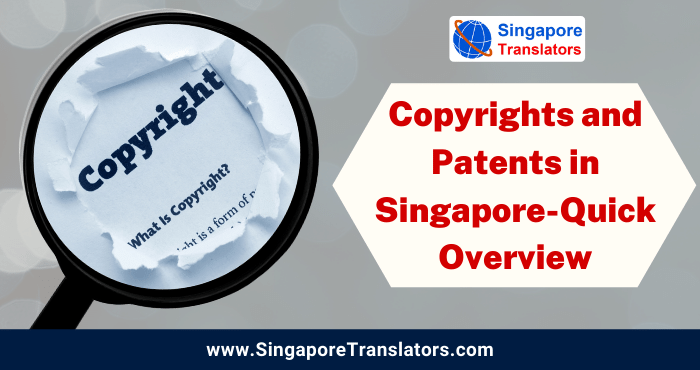The intellectual property protection act in Singapore provide security to all types of intellectual work such as trademark, which is essential for every company to make sure about the identification of their delivered products or services; the copyright protection act provides protection to the literary work, patents, and even computer programs that are mainly used in the industrial sector.

The application for trademark and patent application needs to be submitted with the correspondent department in the Singapore Intellectual Property Office (IPOS).
What is Copyright?
Copyright is defined as the intellectual property right that secures the expression of ideas. From music to plays, copyright secures all the original literary, artistic, dramatic and musical work expressed and recorded in tangible form.
The copyright protection act is not organized to protect the creations or the company’s brand. However, these are protected by trademarks and patents, respectively.
In Singapore, copyright is administered by the Copyright Act 1987.
Need to Register for Copyright Protection in Singapore?
Any copyrighted work done in Singapore automatically reflects under the copyright protection for the work that was eligible for protection. However, you do not need to stress much about the registration of the work done or its paperwork. Hence, this will save the time, effort, and registration fees of the authors.
When do Need a Copyright License?
Authors willing to make their work profit-oriented do not require copyright-licenses or register it as there is no such facility for copyright registry in Singapore. Instead, it is free for the author to license their copyright with the third party to use it as licensing agreement.
Besides this, the author also has the option to acquire the copyright through the written agreement.
Remember, you will no more be the copyright owner after assigning it to the other party. In comparison, acquiring the license grants you to keep the ownership of the copyright while granting the third party to use it.
License is mainly required by the person willing to use the work under the copyright protection act, provided that they are not the copyright owner.
For example, suppose your current provision is a video producer, but you are willing to use the background music of some other person in your video. In such a situation, unless you obtain the license from the actual author of the music, you won’t be able to use the music in your video. However, once you obtain the permit from the author, you will be able to use the music without infringing the author‘s copyright.
In order to obtain the license from the author, you will require to connect with the actual copyright owner directly or with the collecting society who basically manages the particular work in Singapore.
Collecting societies is the organization in Singapore that manages the intellectual property of the copyright owners. For example, COMPASS Singapore handles all the copyright work of the composers and lyricists.
Furthermore, if the use of the copyright work comes under fair dealing, then you no longer require the license. You can determine the fair dealing by considering the following factors given below:
- Consider if the work is used for commercial purposes;
- Actual nature of the work
- Impact on the actual value of the work
- Possible ways of obtaining the work commercially within the given timeframe. (There are larger possibilities that this last factor of determining the fair dealing will be removed in the next revision of the copyright act. This is because these factors create an image that license is needed in all cases).
After the new changes to the copyright act will organize some additional exceptions where individuals can use the copyrighted work without infringing the owner’s copyright or by acquiring the license from the copyright owner:
(A) When the work is being used for data analysis.
When the use of work is bounded only to copying the author’s work only for analyzing the data.
(B) Use by non-profit educational institutions, museums, galleries, libraries, and archives.
In the case of educational institutions, the use of copyrighted work is bounded only to the online works that are present for free and can be used mainly for educational purposes.
However, museum galleries, libraries, and archives are only granted to get copies or publicly perform the audiovisual materials already present in their permanent collection to organize the exhibition.
What are the Requirements for Copyright Protection in Singapore?
In order to get eligible for copyright protection, your work should comply with all the below-mentioned requirements:
1.It must be a literary, dramatic, musical, or artistic work. The artistic quality of the work does not actually matters. For example, a student doodles in class or a painting done by professionals are eligible for copyright protection under the Copyright Act.
- A literary work is usually a work that can be written and includes information that can be read and is easily understandable.
- Artistic work defines sculpture, photography, drawing, building, painting, or any work related to artistic craftsmanship.
- A musical work is referred to as arranging musical notes.
2. Connected to Singapore. According to the copyright act, the author must be a citizen of Singapore or the work was firstly published within the Singapore border.
3. Expressed in a tangible form. As per the copyright act, the work should be reduced down to writing or in some other form of material.
4. Original. Work will be referred to as the original if it is sourced from the actual author. However, those words can also be considered original if similar work is produced by two authors independently.
For example, suppose two photographers click the similar photograph of the Singapore skyline simultaneously, with no knowledge of one another’s work. In such a situation, both works will be provided copyright protection without harming each other copyright.
How Long Does Copyright Protection Last?
For published dramatic, musical, artistic or literary work, the copyright of the work lasts for the next 70 years following the author’s death.
If the work is published after the author’s death, then the copyright lasts for the next 70 years following the date of publishing the work. In case the work was never published, then the copyright protection lasts indefinitely.
However, if the copyright act in Singapore is revised, the copyright protection will not last for the next 70 years, irrespective of whether the work was already published or not.
The copyright of sound recordings, photographs, performances, and films is currently valid for 70 years following the date of release. However, the copyright of the broadcast will last for the next 50 years following the release date of the broadcast.
After the revisions to the copyright act, the sound recordings, photographs, performances, and films will be valid for 70 years from the date it was produced if unpublished or for the next 70 years following the date of publication.
Once the copyrighted work gets expired, the work gets transferred to the public domain. This means those works can be used, build or adapt by anyone for free once the copyrighted work has been expired. As per the copyright act, there is no facility for reviving it.
Rights of a Singapore Copyright Owner
Copyright secures the expression of ideas by providing a number of rights to the copyright owner. Some of these rights rest with the copyright owner includes the right to communicate, adapt their work, reproduce, publish and perform.
We might have seen that the copyright owner is the author of the work most of the time, but it’s not always mandatory. For example, suppose that the author who has done the work sells the copyright of the work done to another person in exchange for some money or service. Several other situations where the author of the work does not hold copyright are explained in detail below.
However, there might be upcoming changes to the Singapore copyright act that might favour the authors. It is the right of the authors to get appreciated and acknowledged for the work they have done. This will help the author boost their confidence, build a good reputation, and encourages them to provide the next work with more dedication.
Is Copyrighted Work Protected Overseas?
No, copyright work is territorial. If the copyrighted work is done in Singapore, it will be only valid within its borders.
Moreover, Singapore is considered a signatory to the agreement on trade-related aspects of intellectual property rights (TRIPS), an international treaty that regulates intellectual property rights worldwide. As a result, any copyrighted work owned in Singapore will also be protected in countries registered with TRIPS.
How is the Owner of the Copyrighted Work Decided?
As mentioned above, the author and the copyright owners don’t need to always be the same. Here are some of the given situations where the owner of the copyright is in the hands of another party:
1.The work was commissioned:
Currently, the copyright of several works like photographers, paintings or drawings, rests in the hands of another party that gives you the commission of the work done.
- The author created the work during employment:
In such a situation, the copyright of the work will be owned by the author’s employer.
What Happens If Someone Infringes My Copyrighted Work?
The infringement of the copyrighted work only happens when any of the individuals exercise the copyright owner’s rights without any permission.
For example, suppose any individuals have used the copyrighted work without acquiring the license or permission to do so and do not comply with any copyright infringement exceptions.
The owner of the copyright can do Singapore copywriter infringement cases if they find that their copyrighted work has been infringed:
Civil proceedings for Copywrite infringes
The copyright owner can sue the suspect for the damages done or for the profit earned with the infringement of copyright. However, the copyright owner also can request the court to take action to prevent the infringer from violating the copyrights in the future.
Criminal charges for Singapore Copywrite increment.
If caught red-handed in making the photocopies of the infringing works with the purpose to sell copies of the copyrighted work, for example, the suspect can be fined up to $10,000 – S$1,00,000 for each infringing copy or can be sent to jail for 5 years or both.
What is the period of protection for copyright trademark and patent in Singapore?
After registering a trademark, it will be secured for the next ten years following the filing date. You have the option to apply for the renewal of the registration after the expiry.
What does copyright protect Singapore?
According to the Singapore copyright act, it is a criminal act for the person or company who willingly conducts copyright infringement. Copyright protection act secures your works like a computer program, please, music, paintings, and literary work.
How much does copyright cost Singapore?
In order to file a patent application in Singapore, the applicant will require filing a PF1/ PF8 form together along with the required filing fee of one S$160.00
Is IP grabbing illegal in SG?
Intellectual property is defined as the inventive processor design secured in Singapore as per the patent law. The owner uses intellectual property. Also, the owner has full right to sell it or license it to earn profit.
What are the main sources of Singapore law?
There are few means sources of Singapore: are given below:
- Constitution
- Subsidiary legislation
- Judge made law
- Legislation
Is it legal to trace an IP address?
You will be happy to know that tracing IP addresses is legal in Singapore only when in use for B2B purposes. However, IP addresses can be considered personal data if connected to an individual; any IP address that relates to a business is considered public information, which means it is legal for your team to track and process the data.
Is IP address confidential information?
As per the data protection act, the IP address in segregation is not considered personal data. However, it can turn into personal data when integrated with other information or when in use to create a profile of an individual no matter if the individual identity is not known.
Hire our certified translators for Cheap translation service
The details provided in the above article are sufficient to understand the protection of copyrights and patents in Singapore and several exceptions associated with it.
If you’re looking to establish a company in Singapore and require a reliable document translation agency in Singapore for legal translation service Singapore. Then, the team of Singapore translators has got you covered. We have a highly experienced translator who provides you with a quick and high-quality documents translation service at a reasonable rate.


